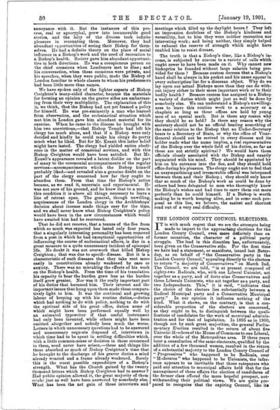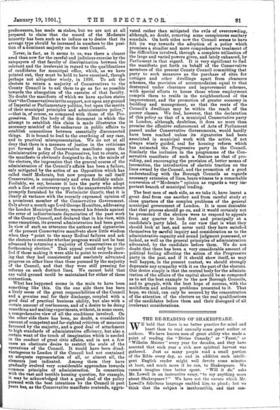THE LONDON COUNTY COUNCIL ELECTIONS.
IT is with much regret that we see the attempts being made to impart to the approaching elections for the London County Council, even more definitely than on former occasions, the character of a political party struggle. The lead in this direction has, unfortunately, been given on the Conservative side. For the first time we have had a statement, or manifesto, issued last Satur- day, as on behalf of "the Conservative party in the London County Council," appealing directly to the electors to return "a majority of Conservatives" on March 2nd. The Council, we are told, "is at present composed of eighty-two Radicals, who, with one Liberal Unionist, act together as a party, and of forty-nine Conservatives and three Liberals Unionists, who act together as a party, and two Independents. This," it is said, "indicates that the choice of the electors lies substantially between a Radical Municipal party and a Conservative Municipal party." In our opinion it indicates nothing of the kind. What it shows, on the contrary, is that a con- siderable proportion of the electors are concerned, as they ought to be, to distinguish between the quali- fications of candidates for the work of municipal adminis- tration and for that of legislation. In 1895 as in 1900, though not by such great majorities, the general Parlia- mentary Election resulted in the return of about five Unionist Members of the House of Commons to one Liberal, over the whole of the Metropolitan area. If three years Inter a consultation of the same electorate, qualified by the addition of a few thousand women, resulted in the return of a substantial majority to the London County Council of " Progressives" who happened to be Radicals, over " Moderates " who happened to be Unionists, the infer- ence appears to us inevitable that those ratepayers who paid any attention to municipal affairs held that for the management of those affairs the election of candidates of the former class offered the more hopeful prospect, not- withstanding their political views. We are quite pre- pared to recognise that the expiring Council, like its predecessors, has made m stakes, but we are not at all prepared to claim that the record of the Moderate minority has been such as to induce us to desire that its average type should be increased in numbers to the posi- tion of a dominant majority on the next Council.
Never, in fact, as it seems to us, was there a clearer need than now for the careful and judicious exercise by the ratepayers of that faculty of discrimination between the relevant and the irrelevant in regard to the qualifications of candidates for municipal office, which, as we have pointed out, they must be held to have exercised, though perhaps not altogether wisely, in 1898. To ask the electors to return a majority of Conservatives to the County Council is to ask them to go as far as possible towards the abnegation of the exercise of that faculty. No doubt the manifesto of which we have spoken states that" the Conservatives invite support, not upon any ground of Imperial or Parliamentary politics, but upon the merits of their municipal principles and administrative policy," —that is, of course, as compared with those of the Pro- gressives. But the body of the document in which the attempt to establish this claim is made illustrates the necessary mischief of the endeavour in public affairs to establish connections between essentially disconnected things. It is bound to lead to the overdoing of any case, and to practical misrepresentation. We do not at all deny that there is a measure of justice in the criticisms put forward in the Conservative manifesto upon the administrative policy of the Progressives, but to create, as the manifesto is obviously designed to do, in the minds of the electors, the impression that the general course of the administration of the Council's affairs has been a failure, only mitigated by the action of an Opposition which has called itself Moderate, but now proposes to call itself Conservative, is conspicuously and even foolishly unfair. Foolishly, we say, because it lays the party who adopt such a line of controversy open to the unanswerable retort promptly furnished by the Westminster Gazette, that it is clearly at variance with the recently expressed opinion of a prominent member of the Conservative Government. Only about a month ago Lerd George Hamilton, addressing the London Municipal Society, warned his friends against the error of indiscriminate depreciation of the past work of the-County Council, and declared that in his view, with some exceptions, its general administration had been good. In view of such an utterance the authors and signatories of the present Conservative manifesto show little wisdom when they "point to the many Radical failures and ask the electors to consider whether progress would not be best advanced by returning a majority of Conservatives at the forthcoming election." That appeal could only be justi- fied if those making it were able to point to records show- ing that they had consistently and resolutely advocated progress on other lines than those pursued by the majority of the Council, and that they were still pressing for reforms on such distinct lines. We cannot hold that any valid ground could be maintained for either of these contentions.
What has happened seems in the main to have been something like this. On the one side there has been a lively sense of the great responsibilities of the Council and a genuine zeal for their discharge, coupled with a good deal of practical business ability, but also with a certain amount of restlessness, and of a desire to be doing something and making experiments, without, in some cases, a comprehensive view of all the conditions involved. On the other side there has been, no doubt, a considerable amount of competent and far-sighted criticism of measures favoured by the majority, and a good deal of attachment to high standards of administrative efficiency, but also a certain want of the touch of imagination which is needed in the conduct of great civic affairs, and in not a few cases an obstinate desire to restrict the scale of the operations of the Council. It would have been disad- vantageous to London if the Council had not contained an adequate representation of all, or almost all, the elements just indicated. Among them they have gradually evolved very considerable approaches towards common principles of administration. In connection with the vast and terrible housing question, for example, it may be acknowledged that a good deal of the policy pursued with the best intentions by the Council in past years has, as the Conservative manifesto contends, aggra- vated rather than mitigated the evils of overcrowding, although, no doubt, removing some conspicuous sanitary scandals. On both sides now the Council seems to have felt its way. towards the adoption of a policy which promises a steadier and more comprehensive treatment of the difficulties involved, through a complete utilisation of the large and varied powers given, and lately enhanced, by Parliament in that regard. It is very significant to find the manifesto put forth on behalf of the Conservative members of the present County Council committing that party to such measures as the purchase of sites for cottages and other dwellings apart from clearance schemes, the provision of accommodation equal to that destroyed under clearance and improvement schemes, with special efforts to house those whose employment compels them to reside in the neighbourhood of the improvement, and the promotion of greater economy in building and management, so that the rents of the Council's dwellings may be within the reach of the poorer classes. We feel, however, that the declaration of this policy as that of a municipal Conservative party in London, although, doubtless, it does no more than promise the effective enforcement of Acts of Parliament passed under Conservative Governments, would hardly have been reached unless its signatories had been associated in municipal work with the active, if not always wisely guided, zeal for housing reform which has animated the Progressive party in the Council. Similarly the inclusion in the programme of the Con- servative manifesto of such a feature as that of pro- viding, and encouraging the provision of, better means of locomotion, the introduction of electric traction on the lines owned by the Council, and the promotion of a good understanding with the Borough Councils as regards necessary extension of lines, bears witness to a remarkable conversion of "Moderate" opinion as regards a very im- portant branch of municipal trading.
The best men of each side, as we take it, have learnt a great deal from one another and from careful study at close quarters of the complex problems of the general municipal government of London. It is most desirable that that process should go on, and it would certainly not be promoted if the electors were to respond to appeals from any quarter to look first and principally at a candidate's party label. In our view that is what they should look at last, and never until they have satisfied themselves by careful inquiry and consideration as to the administrative capacity and sound judgment possessed, or lacked, as well as the general principles of administration advocated, by the candidate before them. We do not doubt that there has been a very considerable amount of political feeling affecting the action of the Progressive party in the past, and if it should show itself, as may well happen, in the present contest, we should strongly deprecate any sympathy with it on the part of the electors. Our desire simply is that the central body for the adminis- tration of the affairs of the capital should be so composed as to set the best example to the new Borough Councils, and to grapple, with the best hope of success, with the multiform and arduous problems presented to it. That hope, we think, can only be secured by the concentration of the attention of the electors on the real qualifications of the candidates before them and their disregard of all irrelevant considerations.







































 Previous page
Previous page